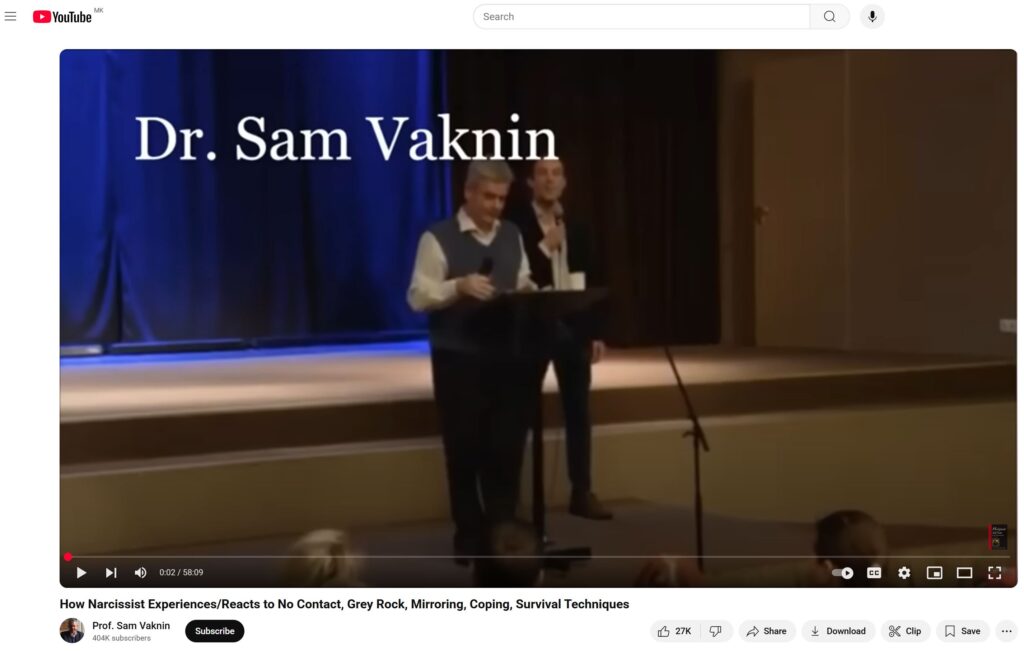Narcissists Uses You In Unfinished Mommy Splitting
Professor Sam Vaknin discusses the concept of splitting in psychology, specifically ego splitting and object splitting. Narcissists and borderlines use splitting as a defense mechanism, but when faced with a mother who is all bad, splitting becomes inverted and the child splits themselves into a true self and a false self. Narcissists have no ego and outsource ego functions, leading to a dissociative and dysfunctional state. They also use projective identification to gain an illusion of control over objects and gain vicarious satisfaction from their activities.
Abuser In Your Mind Self Stalking
Professor Sam Vaknin discusses the concept of self-stalking and the issue of idea-rism, where his work has been plagiarized and idea-rised by others. He also talks about the importance of fathers in the development of children and the aftermath of narcissistic abuse, where victims may internalize abusive voices. In another section, he discusses the difficulty of dealing with the voices in the head of victims of narcissistic abuse and how introjects affect different parts of the victim’s personality. Finally, he talks about the concept of introjection, which is a defense mechanism against neglect, abuse, trauma, and abandonment, mainly in early childhood.
Narcissist’s Two Rejections Giving, Love, And Abuse
Professor Sam Vaknin delves into the relationship cycle with a narcissist, explaining the narcissist’s perception of love, abuse, and rejection. He discusses the narcissist’s internal struggle and the impact of repeated mortifications on the false self. Vaknin also explores the concept of self-love and its connection to loving others, drawing from the works of philosopher Soren Kierkegaard.
Somatic Narcissist’s Shared Fantasy
Professor Sam Vaknin acknowledges mispronouncing words in his videos and discusses the shared fantasy of the somatic narcissist, as well as how narcissists brainwash codependents through a process known as entraining. He explains that the shared fantasy involves co-idealization and the need for idealization in both narcissistic and codependent partners. Additionally, he delves into the differences between the shared fantasies of somatic and cerebral narcissists, emphasizing the somatic’s focus on body admiration, playmate functions, and the mother role. He also describes the somatic’s testing and bargaining phases, including the use of group sex and threesomes to degrade and discard the partner.
Narcissist’s Psychosexuality: Deviant Pervert or Just Kinky Fun?
Narcissists are auto-erotic and focused on themselves as the source of pleasure. Their sexuality is often stunted and thwarted, with somatic narcissists flaunting their conquests and cerebral narcissists often being celibate. Narcissists have highly specific fetishes and are very particular about their preferences. The risk of incest and active pedophilia is higher with narcissists and psychopaths due to their lack of impulse control, boundaries, and obedience to rules.
How Narcissist Experiences/Reacts to No Contact, Grey Rock, Mirroring, Coping, Survival Techniques

Narcissists are victims of post-traumatic conditions caused by their parents, leading to ontological insecurity, dissociation, and confabulation. They have no core identity and construct their sense of self by reflecting themselves from other people. Narcissists have empathy, but it is cold empathy, which is goal-oriented and used to find vulnerabilities to obtain goals. Narcissism becomes a religion when a child is abused by their parents, particularly their mother, and not allowed to develop their own boundaries. The false self demands human sacrifice, and the narcissist must sacrifice others to the false self to gratify and satisfy it.
Narcissist’s Mixed Signals: You His Mother, He Your Father
The text discusses the relationship between empaths and narcissists, the author’s appointment as an editor, and the distorted sexuality of narcissists. It delves into the psychological and familial factors that contribute to a narcissist’s sexual behavior, including sadistic tendencies and the impact on their relationships. The author also explores the narcissist’s preference for sadistic supply over narcissistic supply and the dangers of engaging with a narcissist.
Your Senses, Your Emotions, Your Morality (3rd Intl. Conference on Addiction and Psychiatry)
Professor Sam Vaknin discusses the complexity of emotions and their relationship with cognitions, sense data, and bodily responses. He argues that emotions may be rational strategies for survival and that there is a need for a more basic approach to understanding them. The composition of emotional data is crucial in determining the nature of the resulting emotion and subsequent action.
UNEDITED Why We Prefer Narcissism or Psychosis to Mental Health? (RAW WA Real Convo)
Professor Sam Vaknin discusses various topics related to psychology, including the trauma of selfhood, the role of the mother in shaping the self, the importance of narratives, and the concept of collective unconscious and archetypes. He argues that humanity has chosen narcissistic narratives, which have their roots in the enlightenment, and that narcissism is becoming a religion that deifies individuals. Vaknin warns that this trend towards narcissism and psychosis poses a risk to the survival of the species.
Satisficing Narcissists, Borderlines, And Psychopaths Reject Life
Satisficing is a concept in decision-making theory where one prefers the minimally satisfactory or barely acceptable option. It is linked to narcissistic and psychopathic behavior and was discovered by Nobel Prize-winning economist Herbert K. Simon. Satisficers have low self-esteem, external locus of control, and lack commitment, often leading to mental illnesses such as depression, anxiety, and personality disorders. They also engage in magical thinking and magical immunity, believing their actions or inactions have no real-life consequences for themselves or others.